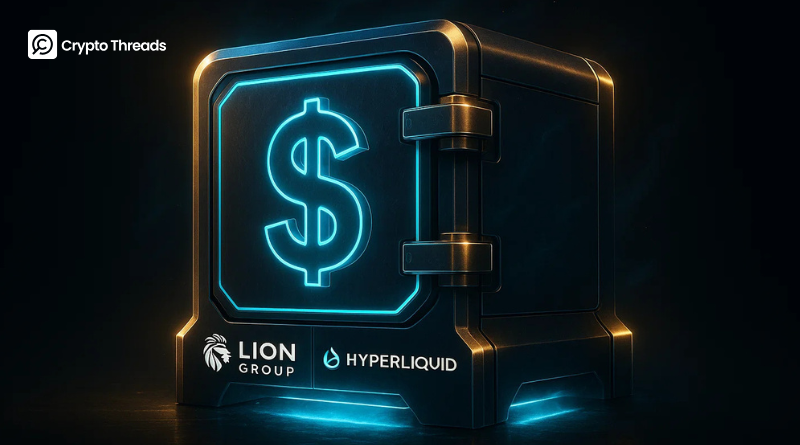Lion Group’s $600M Hyperliquid Treasury
Nasdaq-listed Lion Group makes bold move into decentralized finance with massive HYPE token allocation, marking shift from traditional Bitcoin corporate treasuries.
Corporate treasury management evolution
Nasdaq-listed Lion Group Holding (LGHL) has announced a groundbreaking $600 million cryptocurrency treasury initiative, with Hyperliquid’s HYPE token serving as the primary reserve asset. This strategic move represents a significant departure from traditional corporate Bitcoin treasury strategies and signals growing institutional confidence in decentralized finance protocols.
Corporate Altcoin Treasury Revolution
The Singapore-based trading platform secured its massive facility through ATW Partners, with $10.6 million already deployed by June 19, 2025. This treasury structure breaks new ground by prioritizing a decentralized exchange token over Bitcoin, traditionally the preferred corporate reserve asset.
HYPE price performance analysis
“Hyperliquid represents a natural extension of LGHL’s existing derivatives business into decentralized markets,” explained Wilson Wang, CEO of Lion Group. The company views decentralized on-chain execution as the future of institutional trading, with HYPE’s decentralized sequencing capabilities being foundational to scalable DeFi systems.
Strategic Asset Allocation Beyond Bitcoin
Lion Group’s treasury diversification includes three primary assets:
- Hyperliquid (HYPE) – Primary reserve asset
- Solana (SOL) – Consumer-facing crypto applications
- Sui (SUI) – Backing from World Liberty Financial
LGHL stock price surge
The market responded positively to this announcement, with LGHL shares jumping nearly 20% to $3.33 following the treasury news. This institutional endorsement demonstrates growing confidence in alternative Layer-1 protocols beyond Ethereum and Bitcoin.
Institutional DeFi Adoption Accelerates
“Holding tokens like SOL or SUI isn’t about digital gold; it’s about betting on transaction-heavy, developer-rich networks that power real consumer and DeFi use cases,” noted Jamie Elkaleh, Chief Managing Officer of Bitget Wallet.
Modern crypto treasury framework
This shift represents more than passive treasury management—it’s active ecosystem participation. Companies are increasingly seeking exposure to protocols driving actual blockchain utility rather than merely store-of-value assets.
Hyperliquid’s Institutional Appeal
Hyperliquid’s fully on-chain, friction-free trading model has attracted significant institutional attention. The protocol’s total value locked surged from $400 million to $1.7 billion in 2025, representing a 337% increase that demonstrates growing institutional adoption.
Hyperliquid ecosystem expansion
Max Giege of Merenti Capital emphasized HYPE’s unique value proposition: “It is rare that a native token’s incentives truly track the network’s success.” This alignment between token performance and protocol utility makes HYPE particularly attractive for corporate treasuries focused on long-term value creation.
Broader Market Implications
Lion Group’s strategy coincides with similar moves across the corporate landscape. The same day, another Nasdaq-listed firm, Eyenovia, announced its own Hyperliquid reserve strategy. Additionally, Interactive Strength recently raised $500 million for an AI token treasury focused on Fetch.ai (FET) tokens.
Corporate cryptocurrency adoption trends
This trend indicates a maturation of corporate crypto strategies, moving beyond simple Bitcoin accumulation toward targeted blockchain ecosystem investments. Companies are now viewing crypto treasuries as strategic technology investments rather than purely financial hedges.
Looking Forward: The New Corporate Crypto Paradigm
Lion Group’s $600 million commitment represents more than a treasury allocation—it signals institutional recognition of DeFi’s operational superiority over traditional financial infrastructure. As more corporations follow this model, we can expect increased capital flows into utility-focused blockchain protocols.
The shift from “Bitcoin-only” to “blockchain utility” corporate treasuries marks a pivotal moment in institutional crypto adoption, potentially reshaping how companies approach digital asset investments in 2025 and beyond.



